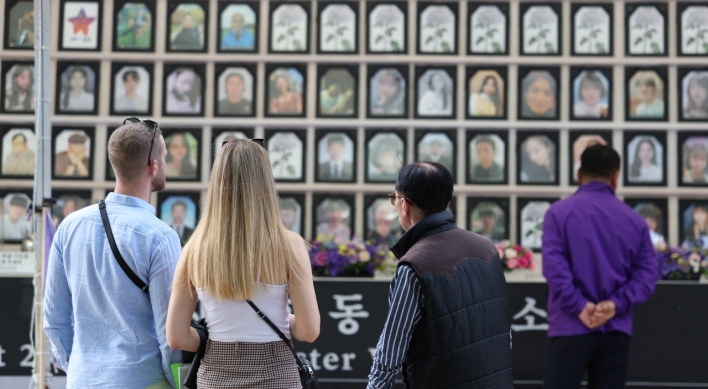[Budget 2017] Rival parties spar over corporate tax hike
By Korea HeraldPublished : Oct. 30, 2016 - 15:39
As the National Assembly last week began a 40-day review of the government’s budget plan for 2017, opposition lawmakers are pushing hard to raise corporate tax, citing the need to curb a growing fiscal deficit.
Ruling lawmakers and the government, however, strongly oppose the idea, saying it would exacerbate the already depressed business sentiment.
Ruling lawmakers and the government, however, strongly oppose the idea, saying it would exacerbate the already depressed business sentiment.

Korea’s fiscal deficit has worsened under the Park Geun-hye administration since 2013.
The accumulated fiscal deficit from 2013 to 2015 amounted to 88.6 trillion won and the government estimates it will reach 115.8 trillion won through 2017. The estimate is a 58 percent increase from the accumulated fiscal deficit of 98.8 trillion won under the previous Lee Myung-bak administration from 2008 to 2012.
The resulting growth in national debt is cited as another cause for raising tax. The national debt has snowballed to 590.5 trillion won as of 2015 and is projected to reach 682.7 trillion won at the end of 2017, exceeding 40 percent of GDP for the first time in Korean history.
The most effective and easiest way to improve fiscal balance has been to collect more tax.
Experts say that while even a slight change in the 10 percent value added tax -- levied on goods and services -- is likely to meet strong resistance both from ruling and opposition parties, corporate tax is the “easiest” target to collect more tax.
The main opposition Minjoo Party of Korea demands a new 25 percent corporate tax rate, 3 percentage points higher than the current 22 percent, for companies earning more than 50 billion won of taxable income. It would collect more than 4.6 trillion won in additional tax per year, the party says. The third-largest People’s Party pushes for a 24 percent corporate tax rate on all companies earning more than 20 billion won.
However, the government and the ruling Saenuri Party repeatedly said any tax raise would bring the economy down.
Finance Vice Minister Choi Sang-mok said at a recent meeting with lawmakers that raising tax could “throw cold water on the economic recovery amid a challenging environment.”
Government officials also assert that Korea’s national debt in proportion to GDP is low -- it is projected to reach 40.4 percent next year, compared with a 115.2 percent projection of the OECD average.
At a public hearing for the budget review, Rep. Lee Hyun-jae of Saenuri Party said many parts of the world were lowering corporate tax rates to boost economic growth.
He also argued, “Although opposition lawmakers say there is no trickle-down effect (from having lowered corporate tax), 30 top conglomerates actually expanded employment by 5.4 percent in the past eight years.”
The corporate tax was last adjusted to 22 percent from 25 percent in 2009.
Considering Korean companies are expanding overseas, such an increase is quite meaningful, he said.
With the rival parties locked in the debate, Kim Jae-jin, senior research fellow at the Korea Institute of Public Finance, suggested a multi-phase approach in raising tax revenue.
“First thing to do is to fill the ‘tax gap’ incurred by evasions of value added tax from companies and business owners. I estimate this to be 9 to 10 trillion won per year,” Kim said.
The second action the government should consider, before reviewing whether to seek any change in corporate tax rate, would be to reduce tax breaks for companies, he said.
Then, the government could consider raising corporate tax for large companies whose annual taxable profits exceed 20 billion won or higher, which seems to serve the purpose of tax equity, Kim said.
“Maybe lawmakers could agree to raise the 20 billion won threshold suggested by opposition lawmakers,” he said.
Yun Hee-suk, director of public finance and social policy at the Korea Development Institute, a state-run think tank, said lawmakers should take a prudent approach in handling corporate tax.
“Opposition lawmakers say companies are sitting on corporate reserves and not spending them in investment. However, this is a big misunderstanding,” Yun said.
People often misinterpret corporate reserves as cash reserves but most companies do not hold them as cash. Most of corporate reserves have already been invested in land, machines and facilities, Yun explained.
“I’m not saying I’m opposed to corporate tax hikes. I’m pointing out how much we should be really careful about changing it.”
By Kim Yoon-mi (yoonmi@heraldcorp.com)
-
Articles by Korea Herald







![[Music in drama] Rekindle a love that slipped through your fingers](http://res.heraldm.com/phpwas/restmb_idxmake.php?idx=644&simg=/content/image/2024/05/01/20240501050484_0.jpg&u=20240501151646)


![[New faces of Assembly] Architect behind ‘audacious initiative’ believes in denuclearized North Korea](http://res.heraldm.com/phpwas/restmb_idxmake.php?idx=644&simg=/content/image/2024/05/01/20240501050627_0.jpg&u=20240502093000)








